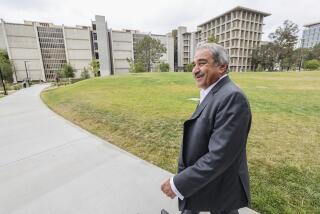Center to Study Elderly Psychosis : Research: UCSD will use federal grant to establish the nation’s first research center on mental illness among the elderly.
- Share via
UC San Diego today received a $2.5-million federal grant to establish the nation’s first research center to study psychosis among the elderly, officials said.
“Late-life psychosis is a problem of extraordinary significance because of financial costs to society and emotional costs to families. As the population ages, we will see more and more older people with schizophrenia and other psychoses,” said Dr. Dilip Jeste, director of the newly formed center.
“Yet there is little known about schizophrenia and aging. Older schizophrenic patients differ from young ones in many biological, psychological and social aspects. It is important to study this growing but largely ignored section of the population,” said Jeste, who is also a UCSD professor of psychiatry and neurosciences.
Under the program funded by the National Institute of Mental Health, about 450 patients will be followed over four years at the UCSD School of Medicine in La Jolla, the VA Medical Center, UCSD Psychiatric Associates in Hillcrest, and the VA Outpatient Clinic in Mission Valley.
Forty researchers from UCSD and the VA facilities will participate in the four-year project studying psychosis, which includes diseases such as schizophrenia, psychotic depression, delusional disorders, and Alzheimer’s disease with psychotic symptoms.
Until recently, scientists believed that the onset of schizophrenia occurred only during adolescence and early adulthood. But Jeste and others have studied patients whose symptoms began after age 45.
“We believe that late onset psychosis is quite different than psychosis in early life,” Jeste said.
With the newly established center, Jeste and others hope to elucidate those differences, studying neurobiological as well as neurochemical changes. Elder schizophrenics usually suffer from persecutory delusions, and sometimes auditory and visual hallucinations. They feel threatened by physical harm from others and sometimes take precautions to ensure that they won’t be attacked. While doctors do not know what causes the disease, they do believe that genetic and environmental factors play a role.
Research at the Geropsychiatry Clinical Research Center, doctors hope, will help them find the missing pieces in the puzzle and better understand the mental illness. Researchers will also study anti-psychotic drug treatments among older patients.
“Schizophrenia is the most expensive mental illness, costing the nation over $10 billion per year in treatment costs, expenditures for public assistance and loss of productivity,” said Dr. Lewis Judd, chairman of UCSD’s Department of Psychiatry.






